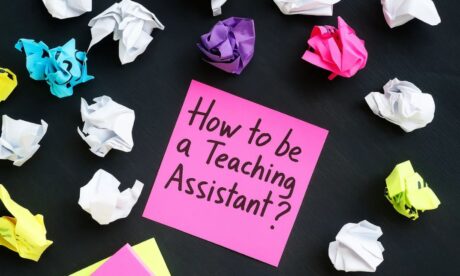How do I train to become a teaching assistant? The good news is it’s easier than it sounds. First, you learn how to help teachers in class and support kids while they’re learning. Then, you pick up useful everyday skills like keeping lessons on track, helping with reading or maths, and handling the usual classroom routines. Most people start with a short Level 2 or Level 3 course and get some real experience by volunteering in a school. After that, it’s all about gaining confidence and moving forward.
Let’s take a closer look at each step and see how you can get started in your teaching assistant journey.
What Does a Teaching Assistant Do in Schools?
A teaching assistant does some of everything to help the classroom run smoothly. Basically, you’re there to support both the teacher and the pupils. Here’s what a typical day might include:
- Help the teacher with day-to-day classroom tasks
- Work with small groups or one-on-one with pupils
- Give extra support to children with special educational needs (SEN)
- Get resources ready and keep the classroom organised
- Supervise pupils during breaks, transitions, or activities
- Give the teacher feedback on how pupils are doing
- Make sure the classroom stays positive and runs without hiccups
How Do I Train to Become a Teaching Assistant?
So, how do you actually get started as a teaching assistant? First, most schools want you to have GCSEs in English and Maths at grade 4 (C+) or something similar, so you can help pupils with reading, writing, and numbers. You’ll also need an enhanced DBS check because you’ll be working with children, and schools must ensure everyone is safe.
Then, there are a couple of ways to get going. You can do an entry-level TA course, which teaches you the basics of helping in class, working with small groups, and supporting different pupils. Many courses even include short placements in schools, so you get some real hands-on experience immediately.
Do You Need Experience Before Starting TA Training?
The good news is you don’t need any formal experience to start most beginner teaching assistant courses. Schools know everyone has to start somewhere. However, having a little hands-on experience can really help your application. For example, observing in a classroom or volunteering in reading clubs, breakfast clubs, or after-school activities gives you an idea of the job. It also shows that you are committed and willing to help. So, if you’re new, don’t worry—a bit of practical experience can make a difference.
What Are the Main TA Qualifications (Level 2, Level 3, HLTA)?
If you’re thinking about becoming a teaching assistant, there’s a clear qualification ladder that helps you take on more in the classroom.
Level 2 Supporting Teaching & Learning
This is the beginner-friendly option, perfect if you’re just starting. Here, you’ll learn the basics of helping teachers, supporting pupils and keeping the classroom running smoothly. You’ll also cover classroom routines, child development, and health and safety. Basically, it gives you the confidence to start working in schools.
Level 3 Certificate or Diploma
Once you’ve got the basics, Level 3 takes up a notch. You’ll learn to run small groups, help pupils with special educational needs (SEN), and support interventions to boost learning. You’ll also pick up skills in behaviour management, safeguarding, and working more independently. This level is great if you want to take on extra responsibility or specialise in SEN or early years.
HLTA (Higher Level Teaching Assistant, Level 4)
For those with experience, Higher Level Teaching Assistant lets you take the lead in the classroom. You can cover lessons, plan activities, and even mentor other TAs. You’ll learn to manage whole-class sessions, support learning across subjects, and get involved in curriculum planning. It’s the next step if you want more responsibility or are thinking about moving toward teaching.
All of these qualifications are regulated by Ofqual and awarded by recognised bodies like CACHE, NCFE, or City & Guilds. This means your skills are officially recognised and respected by schools across the UK.
How Long Does It Take to Train as a Teaching Assistant?
So, how long does it actually take to become a teaching assistant? Well, it depends on the level you choose. A Level 2 course usually takes a few weeks to a few months, so you can start learning quickly. Level 3 courses take a bit longer—often a few months. They usually include some time in a school to get hands-on experience. On the other hand, if you do an apprenticeship, it normally lasts 12 to 18 months while you work and get paid at the same time. Either way, you can start building your skills from day one.
Can You Train Online to Be a Teaching Assistant?
Yes, you can do many Level 2 and Level 3 teaching assistant courses online. The great thing is you’ll have a tutor to guide you and answer any questions, so you’re never on your own. At the same time, any practical tasks or assessments must be done in a school. This means you can study from home at your own pace but still get real classroom experience. So, online courses give you flexibility while making sure you learn the hands-on stuff too.
Do You Need a Placement or School Experience During Training?
It really depends on the course you choose. For theory-only awards, you usually don’t need to spend time in a school. On the other hand, most certificates and diplomas ask for some classroom experience so an assessor can see you in action. This is great because it helps you practice what you’ve learned and shows you can use your skills with real pupils. So, while it’s not always required, getting some hands-on experience is really useful.
How Much Does TA Training Cost in the UK?
The cost of teaching assistant courses in UK can differ depending on the level and provider. For example, a Level 2 Certificate usually costs between £300 and £700, while Level 3 or Level 4 (HLTA) courses can cost £500 to £1,400 or more. Some CPD-accredited online courses are even available for £20 to £100. It’s good to check what’s included, like assessment support, placements and accreditation, so you know you’re getting the best value.
Unified Course is one provider that offers flexible, supported TA courses that allow you to learn at your own pace.
What Skills Will You Learn During a TA Course?
A teaching assistant course helps you pick up all the skills you need to support teachers and pupils. Here’s what you can expect to learn:
- Keeping children safe – understanding safeguarding and your responsibilities
- Supporting behaviour – helping manage classroom behaviour positively
- Helping SEN pupils – working with children who have special educational needs
- Good communication – talking and working well with pupils, teachers, and parents
- Literacy and numeracy support – helping pupils with reading, writing, and maths
- Classroom routines – keeping lessons organised and running smoothly
- Record-keeping and IT – tracking pupil progress and using school systems
- Health and safety – making sure the classroom is safe for everyone
These skills will give you confidence to step into the classroom and make a difference.
How to Choose the Right TA Course for You
Picking the right teaching assistant course can make things a lot easier. Here’s a simple checklist to help:
- Ofqual-regulated – make sure the course is officially recognised
- Fits your level – Level 2 if you’re new, Level 3 or HLTA if you have some experience
- Tutor and assessment support – choose courses where help is available when you need it
- Placement guidance – courses that help you get time in a real school
- Good reviews – see what other students say about it
- Matches your goals – for example, SEN, early years, or HLTA path
This checklist will help you pick a course that suits you and prepares you for the classroom.
What Jobs Can You Get After Training as a Teaching Assistant?
Once you’ve completed your TA training, there are plenty of opportunities to start working in schools. Some common roles include:
- Teaching Assistant (TA) – help teachers in the classroom and support pupils with their learning
- Learning Support Assistant – work closely with pupils who need extra help
- SEN TA – support children with special educational needs and additional challenges
- Reception/Early Years Support – assist younger children in nursery or reception classes
- Intervention TA – run small groups or one-to-one sessions to help pupils catch up
- Agency Day-to-Day Cover – provide temporary support in different schools as needed
These roles give you real classroom experience, help you develop your skills, and open the door to more advanced positions in education.
Can You Progress to Higher Levels Like HLTA or Teacher Training?
Yes, there’s a clear path if you want to move up. You can start with Level 2, then go to Level 3 and later take HLTA (Higher Level Teaching Assistant). After gaining some experience and the right qualifications, you can train to become a teacher. This can be done through a PGCE, school-led route or degree apprenticeship. Along the way, it helps to keep a portfolio of your work and achievements. This shows what you can do and makes it easier to apply for higher-level roles.
Final Thoughts: Start Your Teaching Assistant Journey with Confidence
If you’re trying to figure out how do I train to become a teaching assistant, the easiest way to begin is to take the first step right away. For example, you can join a Level 2 or Level 3 course, volunteer or observe at a local school, and set up job alerts with your council or academy trusts. The truth is, your kindness, reliability, and willingness to learn matter just as much as any course. Once you get going, your skills will grow fast, and you’ll soon feel confident making a real difference for children.
So why wait? Take the next step and enrol in the Level 2 Teaching Assistant course at the Unified Course today to kickstart your journey!
FAQs
1. How long does it take to train to be a teaching assistant?
- Level 2 courses usually take a few weeks to a couple of months. Level 3 takes a few months, and apprenticeships typically last 12–18 months.
2. What qualifications do you need to become a teaching assistant?
- Most schools ask for GCSEs in English and Maths (grade 4/C+) or equivalent, an enhanced DBS, and either an entry-level TA course or willingness to train on the job.
3. Can I be a TA with no experience?
- Yes. Many entry-level courses don’t require experience, though volunteering or observing in a school can help.
4. How much does a TA get paid?
- Salaries vary, but most TAs earn between £18,000 and £25,000 a year, depending on location and experience.
5. Why are schools getting rid of TAs?
- Some schools reduce TAs due to budget cuts or changing teaching strategies, focusing more on classroom-led support.
6. How many hours a day does a TA work?
- Typically 6–7 hours a day during school hours, though part-time roles are also common.
7. Are there any free teaching assistant courses?
- Yes, some online providers offer free or very low-cost CPD-accredited courses, and apprenticeship routes are fully funded by employers.




